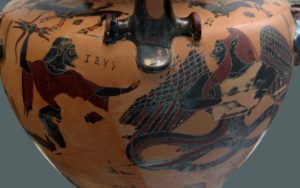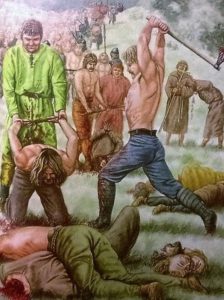I usually add my comments within the posts of Karlheinz Deschner’s Christianity’s Criminal History (to contextualise this series, click here). But what I am about to say is so vital that I prefer to add it as a separate entry.
If Hitler and his closest associates, some of them anti-Christian, had understood that the Christian Question is far more toxic than the Jewish Question (the white traitor is worse than the kike), they wouldn’t have ventured into the Soviet Union.
The evil lay at home, including Hitler’s admiration for Charlemagne, the butcher of Saxons! So at home was the evil, that it was child’s play for the victorious Allies to brainwash the Germans after the Hellstorm Holocaust, in which more Germans died than Jews in the so-called Jewish Holocaust.
Had they known that the CQ was a more serious matter than the JQ, they would have prepared the German people so that, gradually—as Hitler well saw in his after-dinner talks—the Germans would abandon the religion of our (really asshole) parents. It is worth quoting, again, what the Spaniard Manu Rodríguez told me almost a decade ago:
______ 卐 ______
Your words have made me rethink this whole period [of the Third Reich—Ed.]. In this period the Aryan people are identified and recognised for the first time in the history of a people. For the first time, our people became aware of themselves, their origin and their nature. Since the emergence of our people (that primitive nucleus) six or seven thousand years ago, there had been nothing like it. It was a dawn, a new dawn. These were sublime moments.
This ‘birth’ has to do with the emergence of Indo-European studies, and the evolutionary and genetic studies of that time. They spread new knowledge about our biocultural being, our race, and our languages and cultures. It was a recognition. It was like looking in a mirror for the first time. We were there in those texts: in the hymns of the Rig Veda, in the Iliad, the Aeneid, the Edda, the Mabinogion. It was us, our blood, our genius, our race, that had generated those texts, those cultures, those worlds.
The swastika, our banner, was not only raised against liberalism and communism… It is only today that we are beginning to understand the greatness and scope of its mission—our mission. To situate it precisely, we can make these words of Saint-Loup our own:
[Hitler was] the man who had thrown down to the world this extraordinary challenge: to attack at the same time Anglo-Saxon capitalism, Red Bolshevism, Jewish racism, international Freemasonry, the Catholic Church, pauperism and social iniquities, the Treaty of Versailles, colonialism and the French disorder.
And the list is not complete.
It was not just Hitler, but Germany as a whole: the entire German people. It was a collective ‘enterprise’.
The German community was born armed, like Athena, the first Aryan community to awaken or be reborn. And it does so to fight against those who have sought to harm it; against a whole counter-cultural environment that denies its being. Spiritually alienated, it has to fight against the Judeo-Messianic delusion, the ‘Christian millennium’. It wasn’t the only Jewish monster that had to confront this newborn Aryan nation: communism also ravaged the population and others. The Jewish hydra had multiplied, had branched out, and had too many faces, too many heads.
It seems that we have had only one enemy throughout history: the Semitic peoples and their discourses (Jewish, Judeo-Messianic Christian and Muslim). They dominate us spiritually. It is the multiple alienations we suffer at the hands of the Semites or Semitic ideologies (religious, political, economic, anthropological, sociological, psychological…). Our enemy possesses us in one way or another. The dreaded Jewish hydra. Typhon. Evil. Our evil.
 Was it an awakening, a premature birth? Too young was this community to face this age-old Monster. As a young Hero, it failed in its first attempt to defeat it. Too old and cunning such a monstrosity. It engulfed the child, and the young Aryan community, in a few years.
Was it an awakening, a premature birth? Too young was this community to face this age-old Monster. As a young Hero, it failed in its first attempt to defeat it. Too old and cunning such a monstrosity. It engulfed the child, and the young Aryan community, in a few years.
We must rescue the memory of this period and raise it to the top with pride. We should be proud of this period. We lost a battle, but not the war. We are still alive and active… We will beat them at last. I know that.
The birth of our people is conceived in the years before Hitler came to power. The Aryan consciousness of a whole people saw the light then and received its ‘baptism’ publicly. A whole people recognised itself. 1933 was the year of its birth, the first Aryan community to be recognised as such. It was lost in 1945. We are therefore on the 80th anniversary of its birth, the birth of the first Aryan nation, of the Aryan nation itself.
That period is an unparalleled milestone in our short history. The first appearance of our people in history. We are now a people: the Aryan nation.
Hitler symbolises our first period, our first battle and our first loss. His struggle was our struggle. His loss was our loss. But this defeat hasn’t conquered us in our first open confrontation against evil, against our evil. We were defeated, so what? It was a huge thing to fight. Too many hydra tentacles… The war has just begun.
These anniversaries of Hitler and the birth of our people have been for me like a small rebirth too. Let’s say I see more light, I see more clearly. I have a feeling about the next battle—that there will be another battle. And this time we will have a space from which to advance, a bulwark, a solid base: the Aryan nation itself. We will reconquer our people. We have many great spiritual warriors, well-armed with knowledge and truth. In the end, we will win.
This is my spirit now.
Chechar, I feel I owe this letter to you (and to all those I upset with my harsh words about Hitler and the Nazi period).
Regards,
Manu.
(translated from Spanish)
